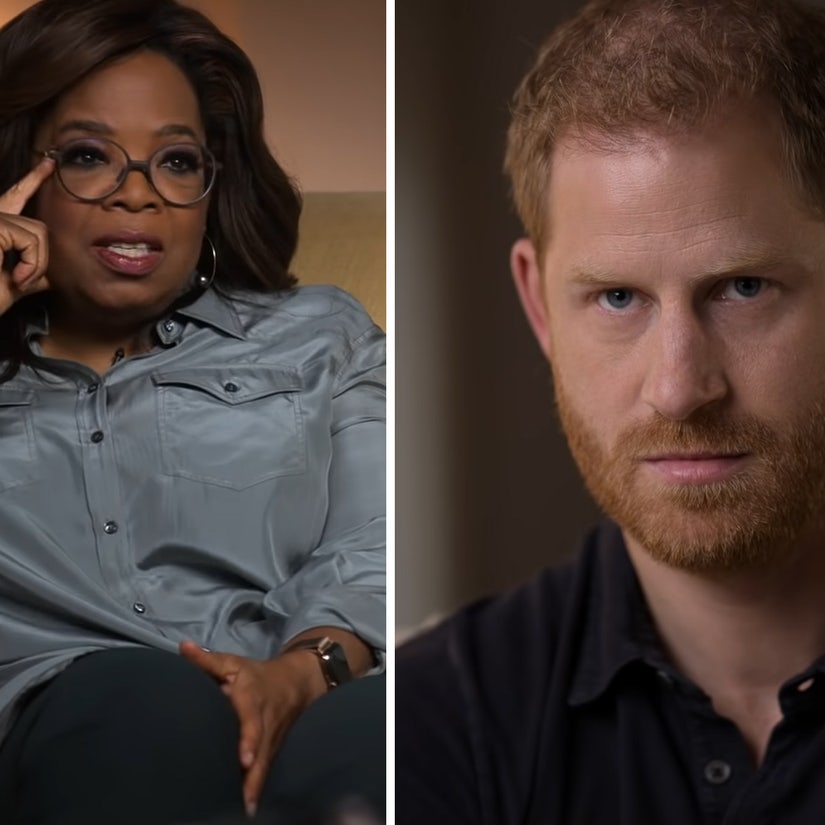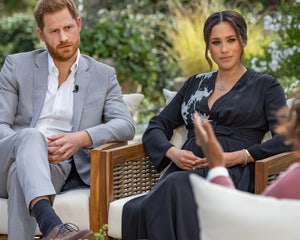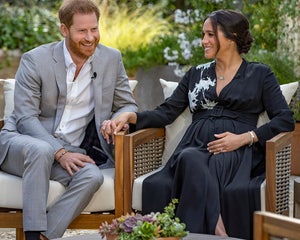Prince Harry Talks Meghan, Diana’s Death and Feeling ‘Trapped’ by Royal Family In Mental Health Docon May 21, 2021 at 1:59 am

“I’ve got a helluva lot of my mum in me. I feel as though I am outside of the system, but I’m still stuck there.”
Prince Harry and Oprah Winfrey teamed up to tackle the stigma surrounding mental health in their new AppleTV+ docuseries “The Me You Can’t See,” which drops in full on Friday.
Throughout the five hour-long episodes — three of which TooFab has screened — the series travels around the world, highlighting stories from those getting brutally honest about their emotional well-being. Harry and Oprah are the only ones who appear in every episode, with the royal giving viewers a deep dive into how his mother’s death affected him in the longterm, how he tried to break the cycle of trauma when he met Meghan Markle and the pushback he got from his family when he did.
According to Harry, he only started therapy four years ago, telling Oprah he finally decided to seek help to “heal myself from the past.” As for why he waited so long, he explained that he “wasn’t in an environment where it was encouraged to talk about it either, that was sort of like squashed.”
Looking back at his memories of his mother, the late Princess Diana, he said the first thing that always springs to mind first is her being chased by paparazzi on mopeds and her being “unable to drive because of the tears.” He said he always felt helpless as a child, too young to help any woman, but especially his mother.
“When my mum was taken away from me at the age of 12,” he recalled, saying he “didn’t want the life” of a royal at the time and hated “sharing the grief of my mother’s death with the world.”
“I was so angry of what happened to her and the fact there was no justice at all, nothing come from that. The same people that chased her into the tunnel, photographed her dying in the backseat of that car,” he told Winfrey. “I don’t want to think about her, because if I think about her, it will bring up the fact I can’t bring her back. What’s the point of thinking about something sad … I just decided not to talk about it. No one was talking about it.”
Harry went on to explain the panic attacks and severe anxiety he would feel throughout his late ’20s, calling it a “nightmare time” in his life. He recalled swearing profusely, being “all over the place mentally” and being more than willing to drink, take drugs and do anything “that made me feel less like I was feeling.” Of his drinking, he said he would sometimes drink a week’s worth of alcohol in a day — not because he enjoyed it, “but because I was trying to mask something.”
Around that same time, Harry said he started asking himself, “Should I really be here?” That, he explained, was when he “suddenly started going, ‘You can’t keep hiding from this.'”
“Family members have said, just play the game and your life would be easier. But I’ve got a helluva lot of my mum in me. I feel as though I am outside of the system, but I’m still stuck there,” he added. “The only way to free yourself and break out is to tell the truth.”
While those close to him started to tell him his behavior wasn’t normal, he didn’t consider actually getting help until he started dating Meghan. He told Oprah, “I knew that if I didn’t do the therapy and fix myself, that I was gonna lose this woman who I could see spending the rest of my life with.”
As the two started dating in public, the media descended on them — with a lot of the coverage and social media talk about Markle stained with overt racism. He said the coverage reminded him a lot of his mother and those feelings of helplessness returned.
“I thought my family would help. But every single ask, request, warning, just got met with total silence or total neglect,” he said. “We spent four years trying to make it work … but Meghan was struggling.”
He also addressed Meghan’s suicidal thoughts, which she opened up about in full with her tell-all interview with Winfrey earlier this year. Markle — then pregnant with Archie — disclosed her feelings to Harry before they were to attend a charity event at Royal Albert Hall. What surprised Harry the most about her demeanor at the time was how “sober” and “completely sane” she seemed.
“The thing that stopped her from seeing it through was how unfair it would be on me, after everything that had happened to my mum and to now be put in the position of losing another woman in my life, with a baby inside of her, our baby,” said Harry, who added he was “somewhat ashamed” of how he dealt with her admission. He was also angry at himself that they were in what felt like a hopeless situation in the first place.
“I was ashamed to go to my family, because to be honest with you, like a lot of other people my age, I know that I’m not going to get from my family what I need,” he said. Despite feeling like they were being controlled by fear, the media and the Institution — “which never encouraged talking about this kind of trauma” — they refused to be “bullied into silence.”
Part of Harry’s healing process was experimenting with EMDR, or Eye Movement Desensitization and Reprocessing, which helps alleviate stress connected to traumatic memories. During one of the episodes, viewers watched him in a session, as he tried to work out why he always felt “worried, concerned, tense and uptight” anytime he flew back into the UK.
“Of course, for me, London is a trigger, unfortunately, because of what happened to my mom, what I experienced and what I saw,” he explained.
“You’ve sometimes got to go back … in order to heal. For me, therapy has equipped me to be able to take on anything. That’s why I’m here now. That’s why my wife is here now,” he continued. “That feeling of being trapped within the family, there was no option to leave. Eventually, when I made that decision for my family, I was still told you can’t do this. I was like how bad does it have to get until I am allowed to do this, when she was going to end her life. It shouldn’t have to get to that.”
He admitted his biggest regret in the situation was not doing more earlier in their relationship, especially when it comes to calling out racism.
“History was repeating itself. My mother was chased to her death, while she was in a relationship with someone who wasn’t white. And now look what’s happened. You wanna talk about history repeating itself? They’re not gonna stop until she dies,” he said. “It’s incredibly triggering to potentially lose another woman I my life. The list is growing and it all comes back to the same people, the same business model, the same industry.”
Noting that his father would tell him and William that they’d have to go through the same things he did, Harry said “that doesn’t make sense.”
“Just because you suffered, doesn’t mean your kids have to suffer. In fact, quite the opposite, if you suffered, do everything you can to make sure whatever negative experience you had, you can make it right for your kids,” he said near the end of the third episode. “We chose to put our mental health first, that’s what we’re doing and that’s what we’ll continue to do. Isn’t this all about breaking the cycle? Isn’t this all about making sure history doesn’t repeat itself? That whatever pain and suffering happened to you, you don’t pass on.”
All five episodes of “The Me You Can’t See” drop Friday on AppleTV+
“I’ve got a helluva lot of my mum in me. I feel as though I am outside of the system, but I’m still stuck there.”
Prince Harry and Oprah Winfrey teamed up to tackle the stigma surrounding mental health in their new AppleTV+ docuseries “The Me You Can’t See,” which drops in full on Friday.
Throughout the five hour-long episodes — three of which TooFab has screened — the series travels around the world, highlighting stories from those getting brutally honest about their emotional well-being. Harry and Oprah are the only ones who appear in every episode, with the royal giving viewers a deep dive into how his mother’s death affected him in the longterm, how he tried to break the cycle of trauma when he met Meghan Markle and the pushback he got from his family when he did.
According to Harry, he only started therapy four years ago, telling Oprah he finally decided to seek help to “heal myself from the past.” As for why he waited so long, he explained that he “wasn’t in an environment where it was encouraged to talk about it either, that was sort of like squashed.”
Looking back at his memories of his mother, the late Princess Diana, he said the first thing that always springs to mind first is her being chased by paparazzi on mopeds and her being “unable to drive because of the tears.” He said he always felt helpless as a child, too young to help any woman, but especially his mother.
“When my mum was taken away from me at the age of 12,” he recalled, saying he “didn’t want the life” of a royal at the time and hated “sharing the grief of my mother’s death with the world.”
“I was so angry of what happened to her and the fact there was no justice at all, nothing come from that. The same people that chased her into the tunnel, photographed her dying in the backseat of that car,” he told Winfrey. “I don’t want to think about her, because if I think about her, it will bring up the fact I can’t bring her back. What’s the point of thinking about something sad … I just decided not to talk about it. No one was talking about it.”

CBS
Celebrities React to Prince Harry and Meghan Markle’s Bombshell Interview with Oprah
View Story
Harry went on to explain the panic attacks and severe anxiety he would feel throughout his late ’20s, calling it a “nightmare time” in his life. He recalled swearing profusely, being “all over the place mentally” and being more than willing to drink, take drugs and do anything “that made me feel less like I was feeling.” Of his drinking, he said he would sometimes drink a week’s worth of alcohol in a day — not because he enjoyed it, “but because I was trying to mask something.”
Around that same time, Harry said he started asking himself, “Should I really be here?” That, he explained, was when he “suddenly started going, ‘You can’t keep hiding from this.'”
“Family members have said, just play the game and your life would be easier. But I’ve got a helluva lot of my mum in me. I feel as though I am outside of the system, but I’m still stuck there,” he added. “The only way to free yourself and break out is to tell the truth.”
While those close to him started to tell him his behavior wasn’t normal, he didn’t consider actually getting help until he started dating Meghan. He told Oprah, “I knew that if I didn’t do the therapy and fix myself, that I was gonna lose this woman who I could see spending the rest of my life with.”
As the two started dating in public, the media descended on them — with a lot of the coverage and social media talk about Markle stained with overt racism. He said the coverage reminded him a lot of his mother and those feelings of helplessness returned.
“I thought my family would help. But every single ask, request, warning, just got met with total silence or total neglect,” he said. “We spent four years trying to make it work … but Meghan was struggling.”

Getty
These Photos, Taken the Day She Told Harry She ‘Didn’t Want to be Alive Anymore,’ Still ‘Haunt’ Meghan Markle
View Story
He also addressed Meghan’s suicidal thoughts, which she opened up about in full with her tell-all interview with Winfrey earlier this year. Markle — then pregnant with Archie — disclosed her feelings to Harry before they were to attend a charity event at Royal Albert Hall. What surprised Harry the most about her demeanor at the time was how “sober” and “completely sane” she seemed.
“The thing that stopped her from seeing it through was how unfair it would be on me, after everything that had happened to my mum and to now be put in the position of losing another woman in my life, with a baby inside of her, our baby,” said Harry, who added he was “somewhat ashamed” of how he dealt with her admission. He was also angry at himself that they were in what felt like a hopeless situation in the first place.
“I was ashamed to go to my family, because to be honest with you, like a lot of other people my age, I know that I’m not going to get from my family what I need,” he said. Despite feeling like they were being controlled by fear, the media and the Institution — “which never encouraged talking about this kind of trauma” — they refused to be “bullied into silence.”
Part of Harry’s healing process was experimenting with EMDR, or Eye Movement Desensitization and Reprocessing, which helps alleviate stress connected to traumatic memories. During one of the episodes, viewers watched him in a session, as he tried to work out why he always felt “worried, concerned, tense and uptight” anytime he flew back into the UK.
“Of course, for me, London is a trigger, unfortunately, because of what happened to my mom, what I experienced and what I saw,” he explained.
“You’ve sometimes got to go back … in order to heal. For me, therapy has equipped me to be able to take on anything. That’s why I’m here now. That’s why my wife is here now,” he continued. “That feeling of being trapped within the family, there was no option to leave. Eventually, when I made that decision for my family, I was still told you can’t do this. I was like how bad does it have to get until I am allowed to do this, when she was going to end her life. It shouldn’t have to get to that.”

CBS
11 Most Shocking Revelations from Oprah’s Interview with Meghan and Harry
View Story
He admitted his biggest regret in the situation was not doing more earlier in their relationship, especially when it comes to calling out racism.
“History was repeating itself. My mother was chased to her death, while she was in a relationship with someone who wasn’t white. And now look what’s happened. You wanna talk about history repeating itself? They’re not gonna stop until she dies,” he said. “It’s incredibly triggering to potentially lose another woman I my life. The list is growing and it all comes back to the same people, the same business model, the same industry.”
Noting that his father would tell him and William that they’d have to go through the same things he did, Harry said “that doesn’t make sense.”
“Just because you suffered, doesn’t mean your kids have to suffer. In fact, quite the opposite, if you suffered, do everything you can to make sure whatever negative experience you had, you can make it right for your kids,” he said near the end of the third episode. “We chose to put our mental health first, that’s what we’re doing and that’s what we’ll continue to do. Isn’t this all about breaking the cycle? Isn’t this all about making sure history doesn’t repeat itself? That whatever pain and suffering happened to you, you don’t pass on.”
All five episodes of “The Me You Can’t See” drop Friday on AppleTV+
